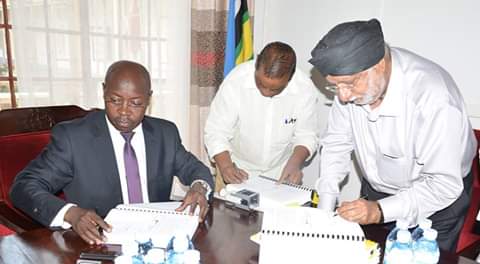
KAMPALA – Contracts to kick-start the construction of valley dams, valley tanks and livestock markets in the districts of Amudat, Abim, Amuria, Bukedea, Kaabong, Kotido, Katakwi, Kumi, Kween, Moroto, Nakapiripirit and Napak were on Thursday signed off by Mr. Pius Wakabi Kasajja, the Permanent Secretary in the Ministry of Agriculture Animal Industry and Fisheries.
The infrastructure, which is being set up through the Regional Pastoral Livelihood Resilience Project being implemented by the Ministry with support from IGAD, is aimed at making adequate water available to the pastoral communities in a more sustainable manner.
Prior to the signing, regional and national maps, as well as data on water resources (including infrastructure) their uses and users, were refined and improved.
A participatory baseline study of the selected districts was also carried out.
The project is funding the construction of 4 valley dams, 8 valley tanks each with an average capacity of 1,750,000 cubic meters and 35,000 cubic meters respectively in locations accessible to pastoral communities in the project districts and along cattle mobility routes; 102 boreholes to be located at cattle markets and communal crushes for communities and for watering their small animals.
The permanent secretary said the livestock markets and production infrastructure are aimed at increasing access to markets in the drought-prone communities to help them participate in the national and regional level markets.
“Preliminary works have been completed we are almost coming to the end of the project with only one year remaining to implement,” Mr Wakabi said.
The Regional Pastoral Livelihoods Resilience Project (RPLRP) is financed by a $40 million loan got by the government from the World Bank and implemented by three IGAD member states; Uganda, Kenya and Ethiopia.
The RPLRP was prepared within the framework of the IGAD Drought Disaster Resilience and Sustainability Initiative and aligned with the Regional Programming Paper and Country Programming Paper.
In Uganda, the RPLRP is aligned to four strategic objectives of the CAS: promote inclusive and sustainable economic growth; enhance public infrastructure; strengthen human capital development; and improve good governance and value for money.
The beneficiaries of this project are the pastoral and agro-pastoral communities in the selected countries and in Uganda the project is being implemented in the 12 districts of Abim, Amuria, Amudat, Bukedea, Katakwi, Kotido, Kaabong, Kween, Kumi, Napak, Moroto and Nakapiripirit. It is estimated that the project will directly benefit 42,000 households in Uganda.
The project is also constructing livestock marketing and production infrastructure including cattle markets with an aim of increasing access to markets and market information by drought-prone communities at national and regional levels through also the establishment of a Livestock Market Information System, this will significantly increase the percentage of pastoralists accessing national and regional market information in the targeted communities through providing a network of information gathering and dissemination centers and mobile phones to the project districts.




